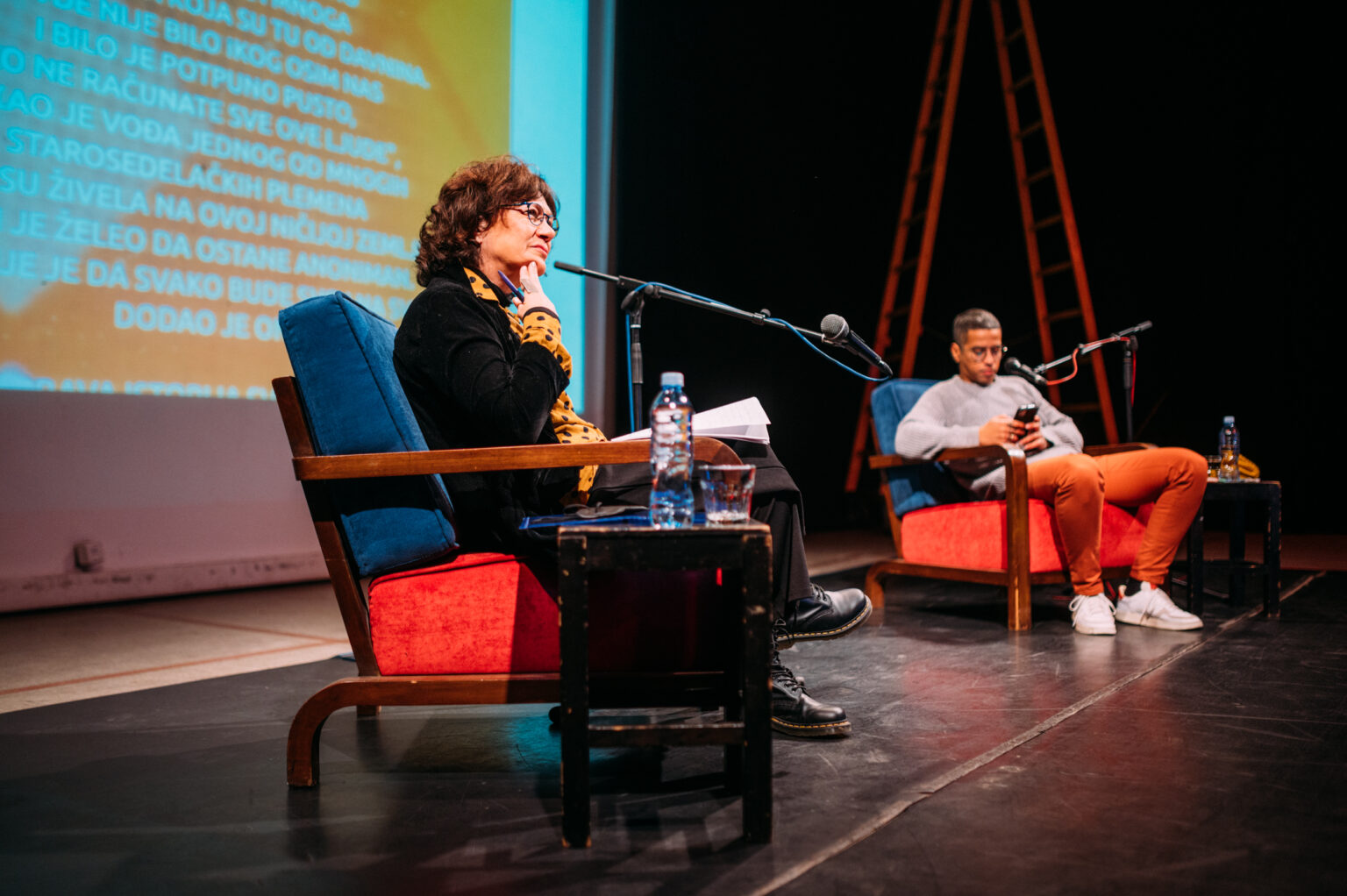
17 Dec From the Panel “In Defense of History”
The panel titled “In Defense of History”was held at 12 pm on November 28th 2020 at the Center for Cultural Decontamination in Belgrade. Croatian historian Dragan Markovina, Bosnian theatre director Dino Mustafić, Serbian journalist Galeb Nikačević and documentary film director Mila Turajlić based in Paris participated in the discussion which was moderated by the well known historian Dubravka Stojanović from Belgrade.
The panel was opened by Milena Berić from Association KROKODIL, the event’s main organizer. She reminded the audience that three years ago Association KROKODIL started working on the “Who Started All This? – Historians against Revisionism” project which brought together the region’s most eminent historians who share the desire to point out the dangers of the manipulation of history.
The “Who Started All This? – Historians against Revisionism” project included a host of panels, summer schools and residential stays, which resulted in the publication of the “Defend History” declaration in June of this year. Milena invited all of those who are interested to sign the declaration on the website www.kojeprvipoceo.rs and announced the final conference which will take place February 2021 in Zagreb, Croatia.
After Milena’s introduction, the word was passed on to Dubravka Stojanović. She explained the motives of her fellow historians for participating in this event. They felt that their respective field was exploited and abused for a number of years, primarily during the 80s. This, in turn, paved the way for the breakup of Yugoslavia. Today, the wars fought in the 90s have in the meantime moved into the realm of historiography. This historical revisionism influences our everyday lives, which is why it is important for as many people as possible to sign the Declaration.
The first question for the participants was how history has been an obstacle in their own experiences. Galeb first thanked Vlada Arsenijević for the invitation to be a part of this panel and Dubravka for her engagement and work for this cause. He said that history was a big ballast in his life and his search for identity. He is a “Non-Aligned” child, with a Somali father and a Serbian mother, and that “status” has followed him throughout his life. He realized that ethnically, religiously and racially he doesn’t belong in this society, and that being “Serbian” means conforming to a certain image. Galeb confessed that even today he is trying to unpack those familial, social and historical connections and relationships, as well as internal conflicts. According to him, he has never been successful and the longer he searched for answers, the more discrepancies he encountered.
What bothered Mila the most was the political abuse of history. As a documentary filmmaker, she often comes across final, absolute truths – about Tito, about Tito’s Yugoslavia– and that’s what scares her the most, because, as she comprehends, no one can own the absolute truth. She reflected on her creations and work experience, and said it can all be epitomized by a dialogue between Ljuba Tadić and Bata Stojković in the movie The Walled In byKokan Rakonjac (Zazidani, 1969), when Ljuba Tadić says: “For you there exists only freedom and slavery, truth and lie, love and hate, and you think that’s life. Although life is always something in between, but never that.” In her films, Mila attempts to deal with that in-between space, complex people whose attitudes are complicated and experiences contradictory. While dealing with such a subject, she simultaneously tries to understand it and make it comprehensible.
According to Dragan, what has marked him the most was his experience of adolescence in Mostar during the war. He observed that most students who enroll to study history as a science, often do so only to confirm nationalist myths. Dragan thinks that, just like during socialism, the big issue today is that there is one dominant truth which cannot be questioned.
Dino said that the 90’s have also influenced him, especially when he was a student of theatre and comparative literature, spending his university years and the war in Sarajevo during the siege. It was then that he began to understand what history is. He saw how many people turned to the parallel world of art because reality was so violent. He then decided to dedicate his work to anti-war and anti-nationalistic themes and pacifist engagement. He noticed that history has become the driving force and fuel for nationalists who still divide society by creating alternative facts.
Dubravka reminded the audience of some more recent uses of history for political purposes and asked the panelists which abuse of history distresses them the most.
Galeb responded by saying that, growing up, he was surrounded by one specific type of person. Over time, he created a dynamic that led him to search for answers, which provoked a metamorphosis in him after which he found himself separated from his old friends and old surroundings. What distressed Galeb the most is the absolute impossibility of communication between the two worlds. It seems they are always trapped in a circle of the same people and their ideas cannot reach those who don’t have the same opinion; and the same is on the other side. We are in a state of constant departure and we seem to be constantly searching for additional ways to widen the gap. At the same time, Galeb warned that too much relativizing of history for the purpose of reconciliation is just as dangerous as a lack of communication, and that the line has to be drawn somewhere.
For Galeb, the documentary “Personal (Hi)stories” is a testimony of the transformation of memories and how much mainstream narratives can influence the creation of our own personal memories and history. In the film, the creators invited people from different regions and different classes and ages from all spheres of society and life, and asked them where they were and how they remembered certain key dates. They concluded that the further they were diving into the past, the more these memories started to resemble newspaper titles, and less personal human experiences – people remember more of the official social narrative, and less of what they were personally doing.
Dubravka responded to Galeb’s story about the dogmatization of the past, with the words of her colleague Neven Budak from the Faculty of Philosophy in Zagreb: “No, the Middle Ages are the most dangerous.” The further back it is the more dogmatic it is, closer to a myth. You almost cannot touch the Middle Ages, while there is still a little bit of freedom to talk about Srebrenica, for instance.
Mila wanted to focus on the way in which narratives are created around an event. Paying attention to media headlines from the opposite end of the political spectrum, it is possible to see how the worldviews of those one is not close to are formed.
Dragan said it is difficult to single out one event, but it remains problematic that no major community has an understanding of the suffering of the other; the modernization of spirit, infrastructure and the state of social consciousness was murdered – we live in an ultraconservative reality. He returned to another problem, the fact that even though we are addressing all the people from the entire region, only those with the same opinion hear us and our message.
Dino said he comes from the art world, which communicates differently with its audience – in the language of emotion and compassion, where they try to understand the other. Art is subversive because it critically questions hegemonic narratives.
Dubravka related how she and her colleagues had been working for six months on the Declaration “Defend History”. During that time they changed it 29 times. Finally, they agreed on 10 main points which deal only with the basis of their cause. Her question was if we as a society really are reduced to the level in which we need to discuss basic things, and why is it neccessary to address the entire region again.
Galeb said that we did return to the root of the issue, due to the fact that we can’t even give a name to the region we live in. He concludes that the only way we can understand each other is through mutual identification. There won’t be any emotions until we find common ground. According to him, that’s what we need to find in this region, a common ground on which we can feel empathy towards each other.
For Mila, rediscussing basic things is not necessarily bad. She thinks it might be a good thing that we have the opportunity to start all over again, with the Declaration but also with our own work.
She said she is very interested in places of memory – museums, monuments, cinemas, and other places where we bring the new generations to acquaint themselves with who they are and where they belong, and which society they are growing up in. Her answer to the question “Who we are addressing” is “the new generations”. The project she is currently working on is dedicated to Yugoslavia and the Non-Aligned Movement, so she has the opportunity to get to know people from a number of different countries and widen the idea of „the region“, and the audience she is addressing.
Dragan thinks that the evolution of society is cyclical and that we are currently in a phase in which the retrograde nationalistic right is winning. However, this time period will pass and what’s most important is that we leave the next generations something they can find support and hope in.
Dino thinks that our region is a nonmaterial space in which there are more things that bring us closer together than those that divide us, which is why the Declaration on the Common Language is so important. For him, that space never ceased to be a unique whole because he has friends and associates from all of the ex-Yugoslav republics and no administrative division can change that. Dino concluded that all they do is take away freedom from institutions which in the past 30 years have made revisionism mainstream in historical science.
The participants then began to answer the questions from the audience – how much can activities such as various declarations and appeals help in trying to change reality? Is the Yugoslav experience unique? Is there any point in trying to change the world if history is repeating itself over and over again?
Dubravka said that we could conclude from her writing that there is no salvation for us, because nothing changed throughouy the last century or two which would imply that everything is predetermined – but that is not her opinion. She believes that we should and could point out our problems while not creating a myth about our past.
Galeb finished his commentary by stating that he doesn’t want to look at our situation as good or bad, but rather as an opportunity to express ourselves and create. He has noticed a problem – we often radically break-up and rupture with the past and build the future on the anti-past. This leads to a lack of continuity in evolution which could, after a certain time, create a generation that perhaps could create something remarkable thanks to their predecessors. He did not neglect the importance of what we are doing because this is only the beginning.
Dragan answered that there is a point in the process of writing appeals and declarations because people in the minority, just like many other thinking people in this region, are becoming aware that there are others out there. With respect to the Yugoslav question, Dragan believes that this is a unique case due to the chain of specific characteristics of this region, but our experience can still be useful for the European Union to look to, because it is currently at the point Yugoslavia was in during the 80s.
Mila said that lately she has been spending a lot of time in Paris, so she cannot comprehend why people don’t believe that the European Union is a political project worth fighting for and that she feels that the experience of Yugoslavia can be educational and useful in that regard. According to her, the Declaration “Defend history” makes sense as the beginning of the long process ahead of us and that it helps create a coordinated system which we will leave to the younger generations.
Sign the declaration „Defend history“ at www.kojeprvipoceo.rs



Sorry, the comment form is closed at this time.